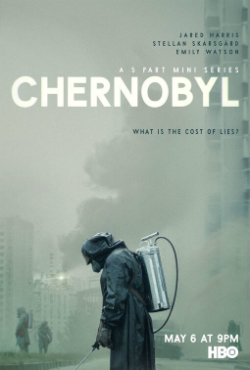 Chernobyl premiered on HBO in May but I put off watching it until a few weeks ago. I was worried it would be bleak and depressing and what’s the point of rehashing a tragedy from decades past? Well turns out sure, it’s bleak and depressing, but it is also a story filled with heroes and bravery, and incredible lessons that we still need to learn to cope with the current political climate.
Chernobyl premiered on HBO in May but I put off watching it until a few weeks ago. I was worried it would be bleak and depressing and what’s the point of rehashing a tragedy from decades past? Well turns out sure, it’s bleak and depressing, but it is also a story filled with heroes and bravery, and incredible lessons that we still need to learn to cope with the current political climate.
The series is a brief five episodes, so it is not a significant time commitment. But boy is there a lot to unpack in each installment. It begins, naturally, with the nuclear meltdown and the immediate response from firemen and emergency personnel and mass confusion among the citizens who live near the power plant. In the subsequent episodes, we are introduced to Valery Legasov (Jared Harris), the scientist tasked with cleaning up this mess and investigating what happened. He is partnered with Boris Shcherbina (Stellan Skarsgard), a gruff soldier who seems like he will be Gorbachev’s stooge and always toe the Communist Party line, but turns out to have much more of a backbone and will shift heaven and earth to get Valery everything he needs for the insane effort to clean up the disastrous radioactivity spreading across the country (and even the globe). Emily Mortimer completes the trio as Ulana Khomyuk, a scientist who talks to the survivors from the power plant and tries to piece together what exactly happened that fateful night. She uncovers state secrets and a conspiracy, and the series finale is all about what exactly individuals can do when the information they possess could benefit humanity but doesn’t benefit their political leaders.
In our era of fake news and refusing to believe scientists, Chernobyl is a painful reminder of the cost of lies and willful ignorance. Dozens of brave first responders died as a result of that meltdown - the firemen trying to put out a fire that simply couldn’t be quenched, and the doctors and nurses trying to save men who had been exposed to unimaginable levels of radioactivity and became thoroughly contaminated by the “yellow powder” themselves. In the days following the meltdown, hundreds of soldiers were conscripted to the region to kill animals, evacuate citizens, cut down trees, and bury radioactive bodies under layers of concrete where they would continue to remain radioactive for the next century. Miners were employed to dig a tunnel under one of the reactors - it was hard work and they quickly ditched all their protective gear, because ultimately, it was never going to save them anyway. When actual robots were incapable of clearing the graphite from the roof of the plant because it was too radioactive, biorobots, aka human beings, were employed instead, wrapped up in protective gear and working in 90-second shifts because anything longer would mean death. Of course, everyone ended up getting cancer and dying several years later of radiation-related illnesses, but the Soviet Union never tracked their numbers. We will never quite know the extent of the disaster.
Chernobyl is brilliantly written and powerfully told. It is compelling and educational, telling a story that I had never thought to pay much attention to. I know the name Chernobyl, but the disaster happened before I was born and seemed to be something we had already dealt with. This series reveals how close the world came to being completely obliterated solely because of a weak government that was more keen on propaganda than the truth. If it were not for the brave scientists and citizens who chipped in to clean up the mess, giving up their lives so the rest of the world could be safe, everyone would be much more aware of Chernobyl. Now, however, thanks to this series, we can be aware of these heroes and their sacrifices. And have a think about whether we are yet again putting politics above science and dooming the world to catastrophe.
No comments:
Post a Comment